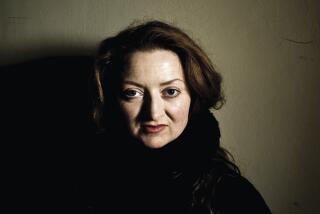Anthony Powell; Wrote Acclaimed 12-Part Novel
Anthony Powell, the distinguished British author whose 12-volume “A Dance to the Music of Time,” detailing the metamorphosis of the English upper class over more than five decades, made him a 20th century literary icon, has died at age 94.
Powell died Tuesday at his rambling 19th century mansion called the Chantry near Frome in Somerset, England.
“Dance,” characterized as a roman fleuve--literally “river novel” or flowing long novel--was indeed the longest novel in English, and many literary critics considered it the best work of English fiction in the 20th century.
The saga was often compared with Marcel Proust’s “Remembrance of Things Past,” a comparison Powell himself derided.
Already a proven novelist when he undertook the massive project, Powell wanted to break the boundaries of standard novels and have one set of characters continue through several volumes. He found his title--and the metaphor for the changing life he wanted to describe--when he happened upon Nicolas Poussin’s painting “A Dance to the Music of Time.”
The artwork depicts the four seasons as four buxom young women dancing to music played by a wizened Father Time. The book is arranged in four trilogies representing the four seasons of life. Powell even gave Poussin’s first name to his protagonist, Nicholas Jenkins, albeit with an English spelling.
The 12 separate titles take Jenkins from 1914 through the early 1970s, through school, the very busy social scene, career, war, marriage and family--in other words, life, in an ever more egalitarian England: “A Question of Upbringing,” “A Buyer’s Market,” “The Acceptance World,” “At Lady Molly’s,” “Casanova’s Chinese Restaurant,” “The Kindly Ones,” “The Valley of Bones,” “The Soldier’s Art,” “The Military Philosophers,” “Books Do Furnish a Room,” “Temporary Kings” and “Hearing Secret Harmonies.”
Although Powell wrote “Dance” over 25 years, from 1951 to 1975, he kept track of its hundreds of characters in his head, using no files or charts. Writing, he believed, must be as “intuitive as possible” and therefore without careful planning.
Yet the 12 volumes emerged well organized, a tapestry of interwoven lives over more than half a century of world change.
“The novel’s closing pages, written 25 years after the opening,” observed Newsweek reviewer Gene Lyons, “make so perfect a fit they might have been the product of a single morning’s work.”
At one point in the gargantuan project, Powell found himself so “sick to death” of it that he veered off to write two plays, “The Garden of God” and “The Rest I’ll Whistle.”
And when he published the final volume of “Dance,” the author wasted no time on nostalgia. “I always used to reread the whole thing before starting a new volume,” he told one interviewer. “It was tortuously boring.”
He set to work immediately on a four-volume memoir, “To Keep the Ball Rolling.” Tongue always elegantly in cheek, he cautioned one questioner that the memoir would in no way resemble the seemingly autobiographical “Dance” because autobiographies, unlike fiction, “have not a word of truth in them.”
Born in London, the only child of a lieutenant-colonel in the Welch Regiment, Powell was educated at Eton and at Balliol College of Oxford University. He worked nine years as an editor for London publisher Gerald Duckworth & Co., which published his five darkly humorous prewar novels--”Afternoon Men,” “Venusberg,” “From a View to a Death,” “Agents and Patients” and “What’s Become of Waring?”
Powell left the publisher in 1936 for a brief fling as a scenarist at Warner Bros. in Britain. He became so enamored of motion pictures that he came to Hollywood looking for a job as a scriptwriter. But movie moguls apparently didn’t recognize his literary ability--he couldn’t get hired.
Powell reviewed books for the London Daily Telegraph, the Times Literary Supplement, Punch and other publications over several years.
World War II forced a six-year career hiatus for the writer, as he served in the Welch Regiment infantry and then British military intelligence.
After the war, he was slow to return to fiction, writing instead the respected biography “John Aubrey and His Friends.” Then came the 12-volume “Dance,” the four-volume memoir, a few more novels and in his later years a series of journals of his musings on other writers.
Powell’s work itself became the subject of a book, “The Novels of Anthony Powell,” in which James Tucker tried to describe Powell’s impact: “The distinction of Powell’s novels is that they engagingly look at surfaces and, at the same time, suggest that this is by no means enough. They will continually disturb the surface to show us much more. In their quiet way they direct us towards a good, practical, unextreme general philosophy of life.”
Among Powell’s awards collected for wartime service and for his extraordinary writing were the Czechoslovakian Order of the White Lion, the Belgian Order of Leopold II, the Luxembourg Croix de Guerre and Order of the Oaken Crown and in 1988 appointment as a British Companion of Honor for “conspicuous” national service.
Powell was married for 65 years to Lady Violet Pakenham, daughter of the fifth earl of Longford and herself a writer, and they had two sons, Tristram and John. All survive.
As much as his masterwork awed the literary world, the witty Powell never permitted the praise to affect his own appraisal of himself, commenting in 1990: “I look at ‘Dance’ now, and think . . . what an extraordinary chap I must have been to have written all this stuff.”
More to Read
Sign up for our Book Club newsletter
Get the latest news, events and more from the Los Angeles Times Book Club, and help us get L.A. reading and talking.
You may occasionally receive promotional content from the Los Angeles Times.






